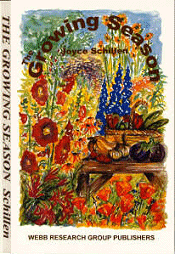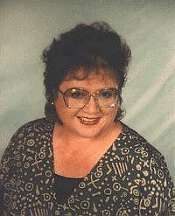

Some of my low-tech friends wonder what high-tech has to do with gardening. After all, working in the soil, fussing over plants, and watching them grow couldn't be further removed from clicking keyboards and luminescent screens shining in a dim room, could they?
High tech works in my garden while I'm writing about it on a computer, of course. Also when I'm exchanging ideas with other gardeners and searching for answers on the internet. But high tech is also congruous with gardening because of the gardening software that is popping up with increasing frequency.
Some software is useful for garden planning and record keeping. Other is strictly for reference -- think of it as very tiny books you go to for information when you need it. Instead of turning the pages and searching an index of a book, you pop a disk into the computer and type in the information you're seeking. While the package is tiny, the information is not. There is an incredible amount of information available to gardeners on floppy disks that are merely three and a half inches wide, and even more on five-inch CD-ROM.
One excellent CD that is not very well known is "The Ultimate Garden Tool" edited and published by Mary Bolack of Electric Mulch, Ltd. The brochure states "Experience is the essential ingredient in a successful garden. But if you don't have experience with a particular plant, task, or problem, it's nice to have a panel of experts at your beck and call. Then when you need to know how to deal with that dry shady nook in your yard, or what that strange red bug is, you'll know you're getting advice you can trust.
"The Ultimate Garden Tool--A Searchable Reference Collection (Electric Mulch Ltd.) brings that panel of experts right to your keyboard. This CD contains over 14,000 pages of information from respected authorities across the nation. Just type in a query and you get a list of documents that answer your question.
"The documents come from cooperative extension services across the country, as well as plant societies, urban garden associations and others who deal with gardening pleasures and problems daily. Over 3,000 separate documents mean that you will find information that applies to your plants, in your own area of the country, as well as general answers that apply to gardens in a number of growing climates."
I decided to put "The Ultimate Garden Tool" to the test. How about veggies such as okra and chayote squash? They're not exactly mainstream. Only one document showed up for chayote, but a good description was there. A search for okra turned up 58 documents, including Extension bulletins with detailed growing and harvesting instructions. Likewise, I found buddleia, basil, and lavender.
In addition to numerous plants I was able to pin down information on techniques and problem solving: the effects of light on plants, rotenone, deer control, baking soda, black spot, and cottonseed meal (as a fertilizer). I tried hard for an hour and could not stump the program. Information covers herbaceous and woody plants, fruits, vegetables, herbs, insect and disease diagnosis and management, backyard wildlife, landscaping, and more, and it gives organic, chemical, and IPM methods.
Documents may be printed for further use.
On first reaction the $95 cost seemed a bit high to me, but the convenience of having all this information pulled together in one place justifies the price. For details call 918-438-6569 or e-mail to mbolack@hortsoft.com.
On a more low-tech note, the Medford Garden Club is holding a plant sale Saturday, October 5, in front of the Red Cross building on Hawthorn Street across from the park. They will have perennials and garden-related items for sale and the public is invited.
End of article Joyce Schillen (So. Oregon) ~~~ gardenpg@cdsnet.net http://www.cdsnet.net/Business/GardenPages "The Growing Season" now available (ISBN 0-936738-12-x, Webb Research Pub)